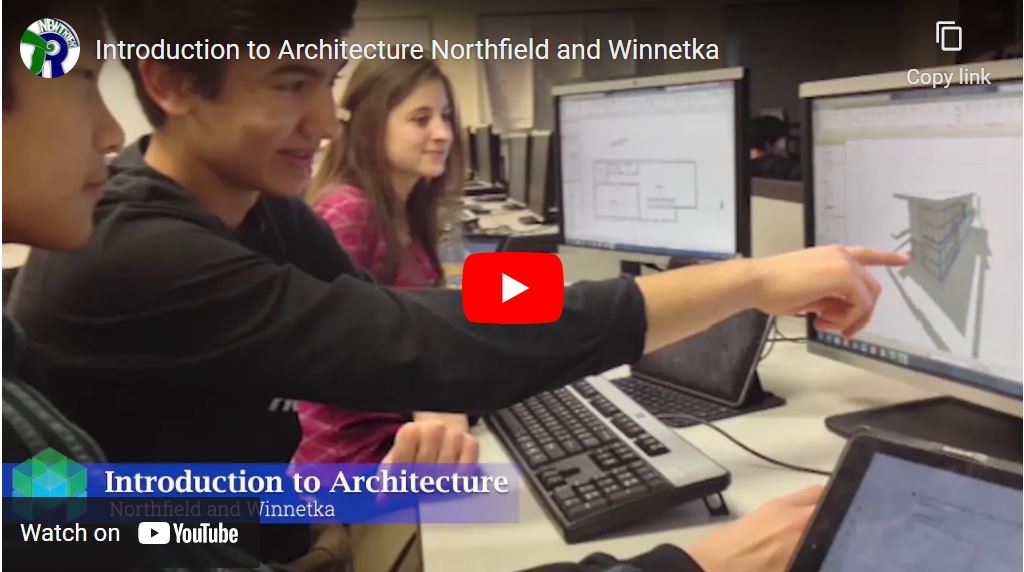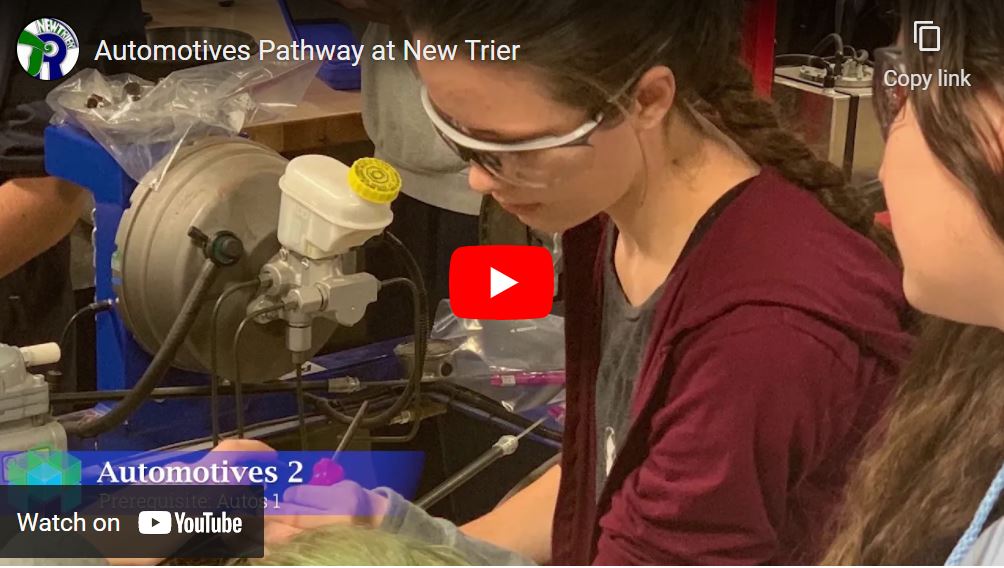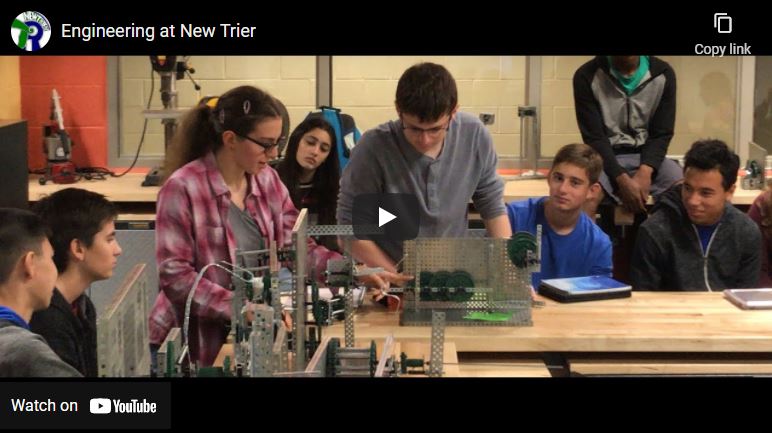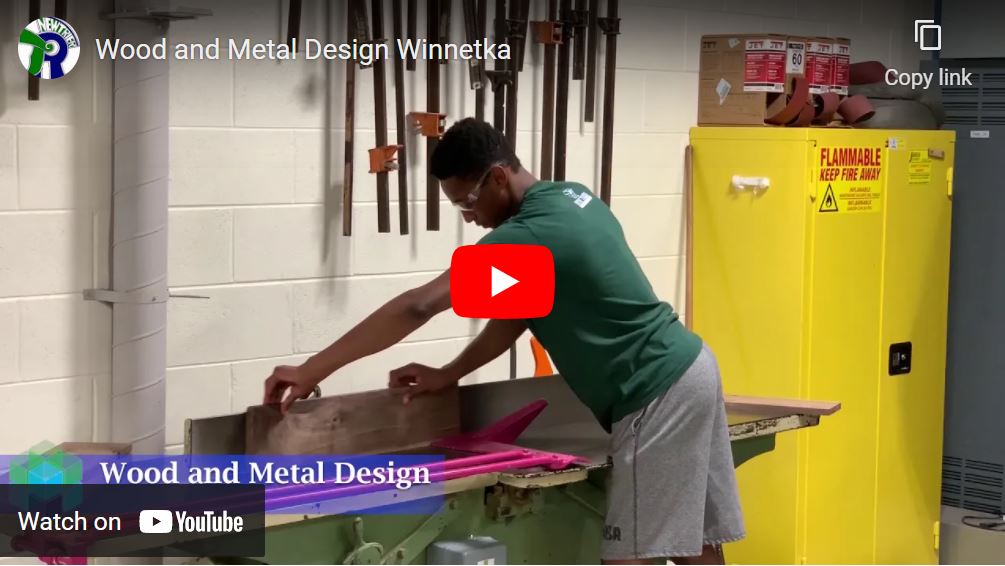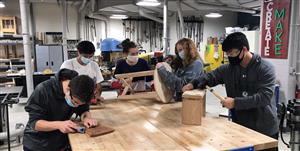-

Culture of Curiosity, Exploration, Authentic Experiences, Real-World Learning, Discovery, Learn by Doing, & Making:
-
Purpose, Belonging, Interest, Passion & Dreams:
-
Aerospace Engineering
Aerospace Engineering
Focus: Planes, Rockets, Drones, Rovers
This course will explore aerospace engineering, data analytics, coding, and physics. Students will explore the principles of aerodynamics, spacecraft, and innovative technologies, while focusing on designing solutions that meet human needs and aspirations. Through hands-on projects and real-world applications, students will gain an understanding of the aerospace field and its impact on future technologies. Students who earn qualifying grades may be eligible to receive engineering dual college credit. This course fulfills the graduation requirement for fine and/or practical arts.
-
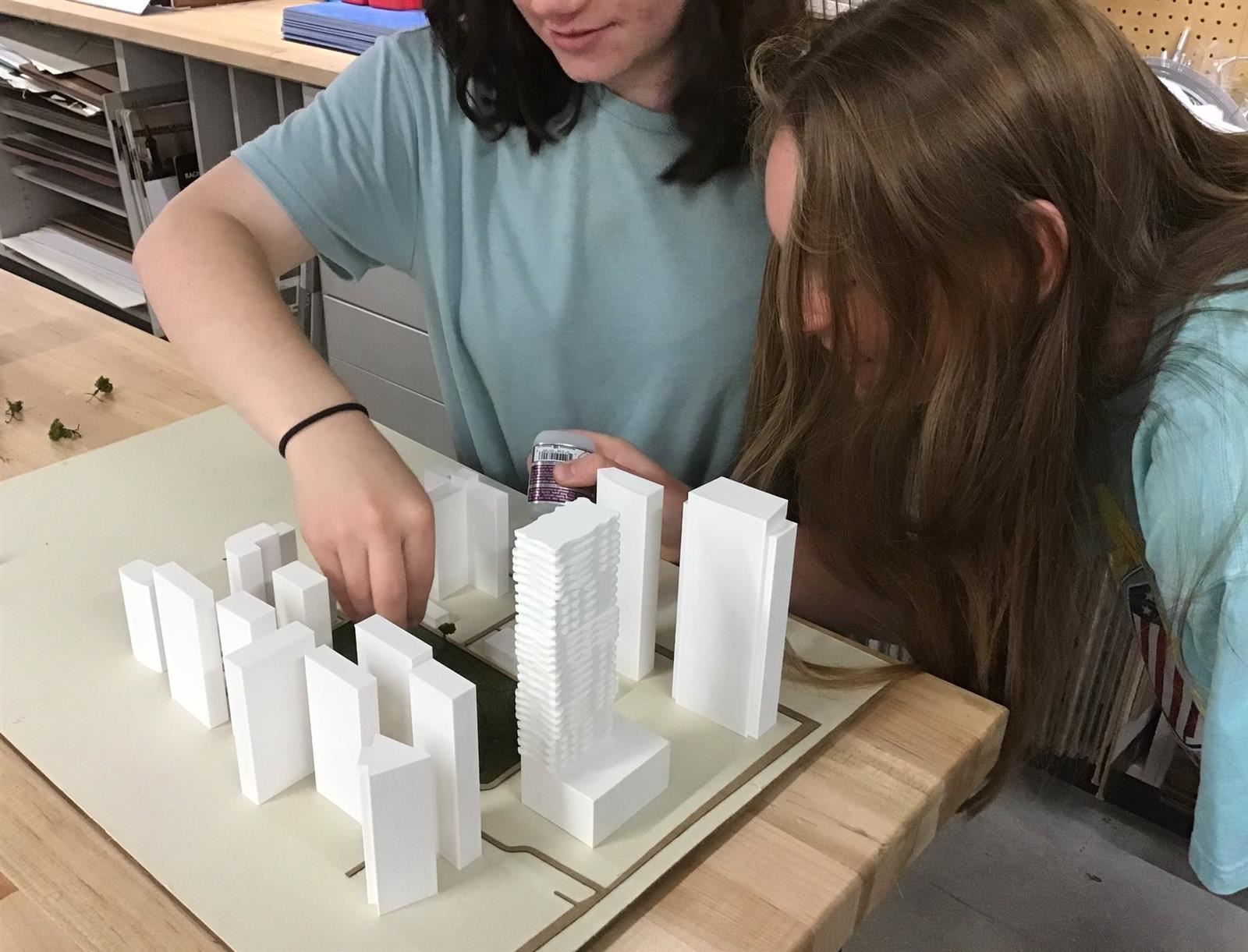
Architectural Models
Architectural Models
This course focuses on the creation of studio models through the process of developing architectural designs and responding to challenges presented by the instructor. Students learn architectural processes and develop design skills using different materials, software, technologies, and building techniques. Students are challenged to create spaces based on positive and negative space, form and function, and design principles. All methods, concepts, and technologies taught are currently utilized by architecture firms and universities. Architectural models is a course for students interested in a future that includes architecture and interior design. All work created in this course can be used for a personal portfolio. This course fulfills the graduation requirement for fine and/or practical arts.
Learn more about this expereince here: Link
-

Architectural Studio
Architectural Studio
This course introduces students to a full range of design concepts, current trends, and architectural techniques through drawing exercises, analyses of precedents, and exploration of design methods. Design skills are developed by conceptualizing and representing architectural theories through sketching, drawing on board, and abstract models. Discussions about architecture’s role in culture, nature, and technology help students develop architectural vocabulary. In the second semester, students develop a “green” architectural structure, following LEED standards. All work created in this course can be used for a personal portfolio. This course qualifies for dual credit at Oakton College. This course fulfills the graduation requirement for fine and/or practical arts.
Learn more about this experience here: Link
-
Automotives 1 & 2
Automotives 1
Ever wonder how an electric or gas powered vehicle works? Do you have a curious interest in just getting to know about a car for a consumer standpoint? Do you have an interest in discovering how to repair, fix and work on vehicles that are both electric and gas?. Students from all backgrounds will work on hands-on projects that involve building an electric go-kart, working on automotive components, common repairs, routine maintenance, rebuilds, small engines and even welding. This collaborative and inclusive environment allows all students regardless of experience or knowledge to explore, play and discover. This course fulfills the graduation requirement for fine and/or practical arts.
Learn more about this experience here: Link
Automotives 2
This course is a continuation of Automotives 1. Additional theory is provided along with a strong emphasis on hands-on lab activities. Students refine their diagnostic and repair skills in a lab setting and have the opportunity to spend additional time working on personal or extended projects. In the classroom a variety of technical topics are covered, including high performance systems, alternate fuels and energies, and fabrication. Automotive careers within the automotive field are explored and discussed. Careers examined range from technician, engineering and design, to sales and marketing. This course fulfills the graduation requirement for fine and/or practical arts.
-
Biotechnical Engineering
Biotechnical Engineering
Biotechnical Engineering is a specialized course that requires students to apply engineering skills learned in Introduction to Engineering Design and Principles of Engineering to problems in a diverse set of biotechnical engineering fields, including biomedical devices, orthopedic prosthetics, genetic engineering in agriculture and medicine, bioremediation, biofuels, and bioethics. The Biotechnical Engineering course is designed to challenge students in unstructured problem solving within a project-based format in a lab setting. This course fulfills the graduation requirement for fine and/or practical arts
Learn more about this class here: Link
-
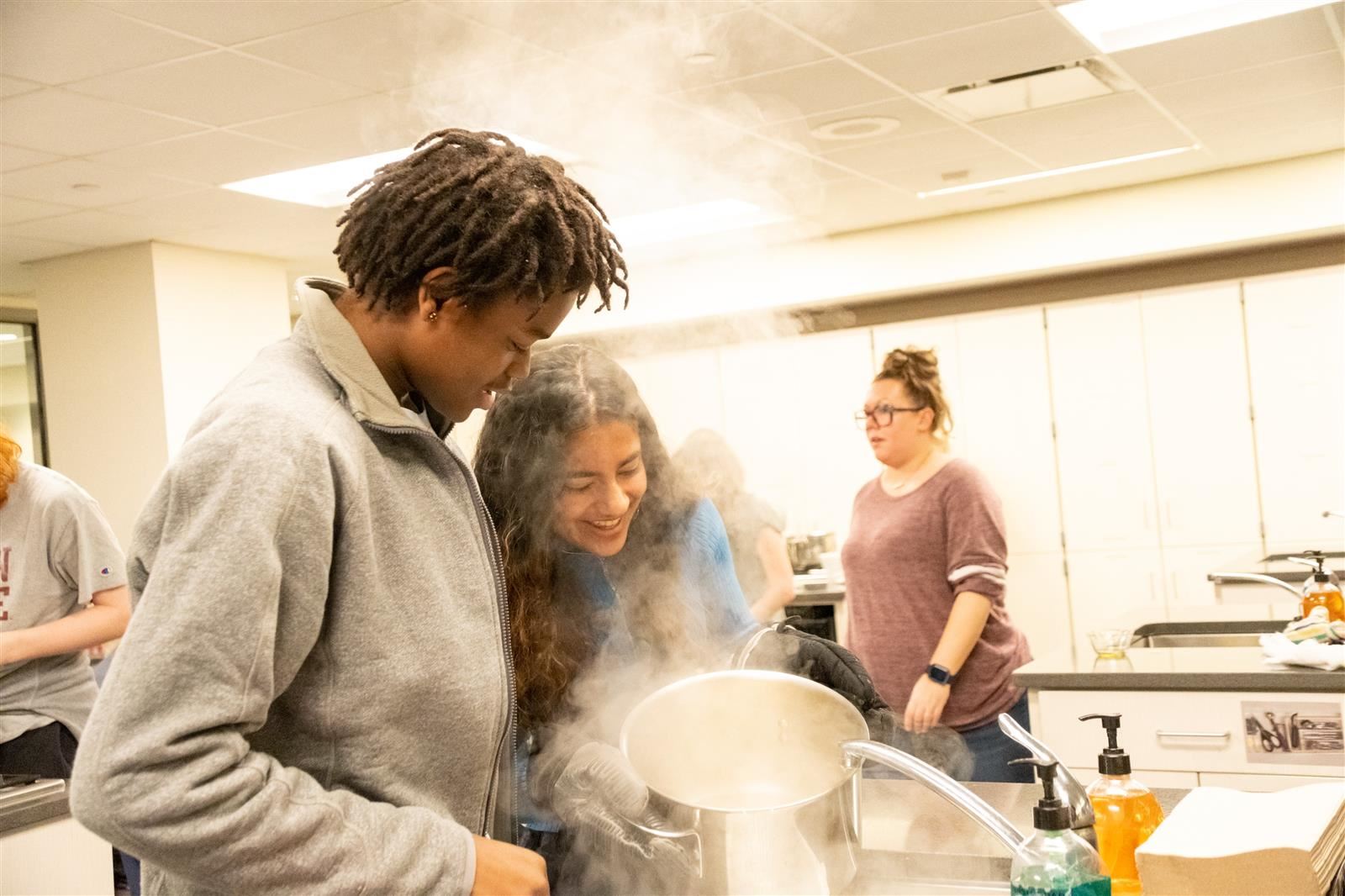
Consumer Math and Culinary Arts
Consumer Math and Culinary Arts
This interdisciplinary course, taught out of the Culinary Court, provides students an opportunity to apply consumer skills to real life scenarios through opportunities such as budgeting, meal planning, and grocery shopping. Additionally, students will have the opportunity to practice practical math skills through preparation of basic meals. This course will also meet the Consumer Graduation requirement.
Link to learn more about this experience here: Link
-
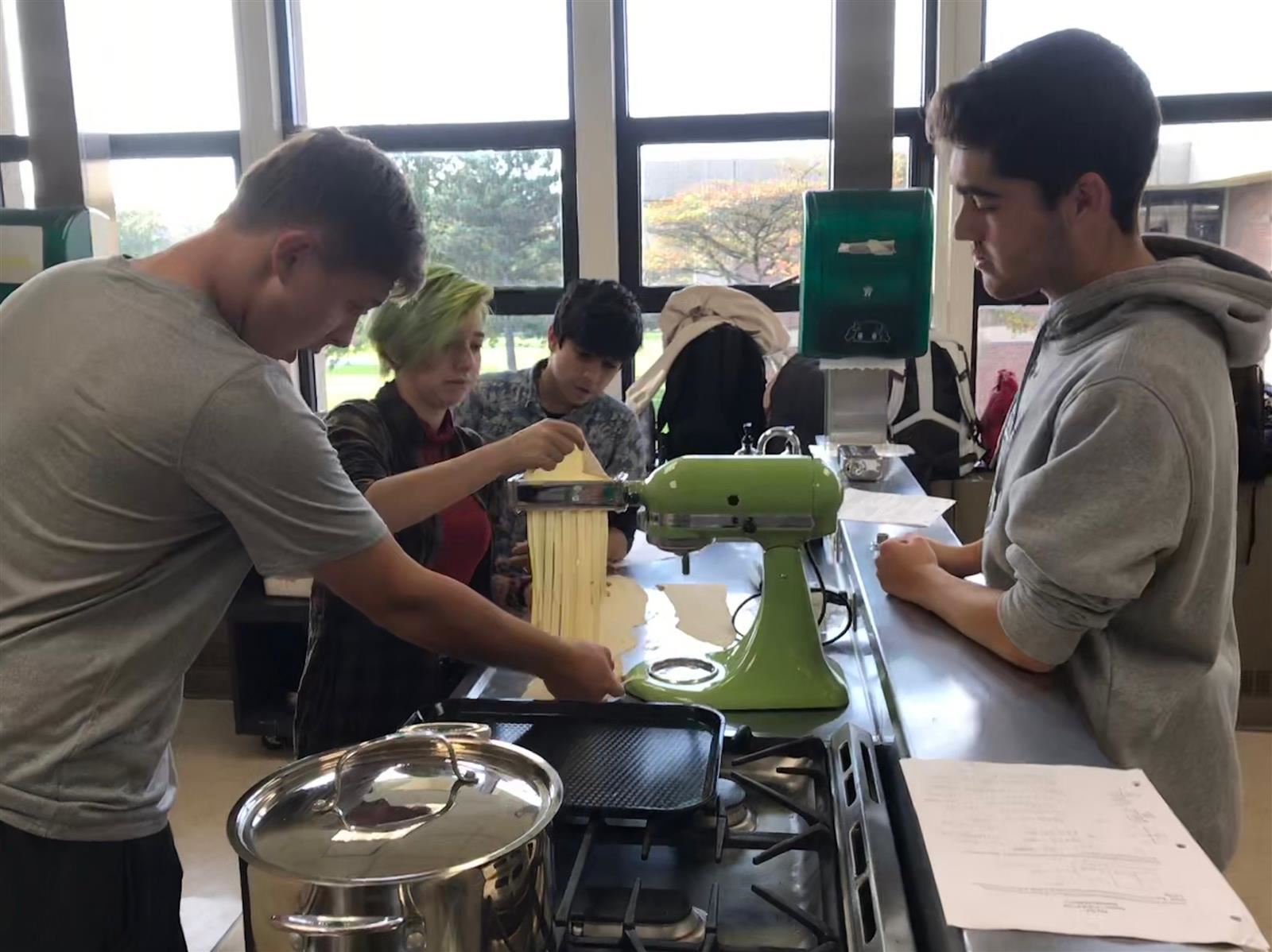
Creative Cuisine
Creative Cuisine
Only open to Freshman on the Northfield Campus! This course will introduce students to the basic techniques used in the preparation of food. Laboratory work includes group activities in the planning, preparation and serving of food. Among the topics covered are quick and yeast breads, appetizers, pies, soups, sauces, fruits, vegetables, main dish meals, and desserts. Some course favorites include fried rice, vegetable lo mein, pizza, smoothie bowls, hot chocolate cookies and more. Nutrition and menu planning are also discussed. Cook and eat every day!
Click here to learn about this class: Link
-
Digital Electronics
Digital Electronics
Digital Electronics is a pre-engineering course for students interested in computer engineering, electrical engineering, and/ or computer science. In this course, students learn the systematic approach used by engineers to design and create the electronics we use every day. They also become familiar with the engineering design and troubleshooting techniques used in the electronics field through designing circuitry and building with fundamental components, such as transistors, gates, and flipflops. Later in the course, students design, code, and build machines controlled by programmable logic devices, such as Arduino and Raspberry Pi microcomputers. In all of these projects, students develop an understanding of how machines “think.” Students who earn qualifying grades may be eligible to receive engineering college credit. This course fulfills the graduation requirement for fine and/or practical arts.
Learn more about this experience here: Link
-
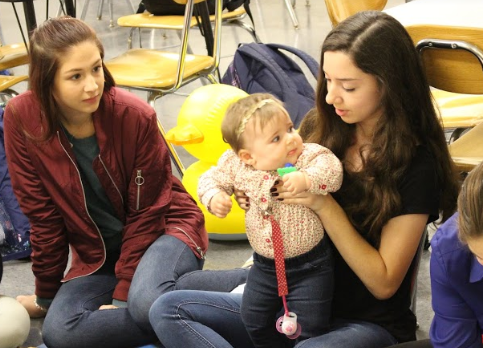
Foundations of Teaching
New Course: Foundations of Teaching
Semester Option
This semester course is designed to introduce students to the fundamental concepts, theories, and practices of teaching. It covers the essential knowledge and skills required to become an effective educator. Students will explore the historical, philosophical, psychological and ethical foundations of education which underpin best practices in instruction, classroom management, and assessment. Diversity and inclusion will be highlighted as each topic is addressed. This course fulfills the graduation requirement for fine and/or practical arts.
-
Game Design 1 & 2
Game Design 1
This semester course introduces students to fundamental principles of game design and 2D computer animation using software that allows for interactivity through web browsers and mobile platforms. Students will learn techniques to design and develop characters, props, levels, and user interface. Students will create four exciting game prototypes and a personal project, learning both the theory and practical skills of game development. Through engaging programming, learning design principles and debugging challenges, students will refine their projects and be exposed to the game design field. This course fulfills the graduation requirement for fine and/or practical arts.
Game Design 2
This semester course builds on the foundational skills of Game Design 1, allowing students to design and create their own (interest project) video games based on a chosen theme. Students will apply human-centered design principles, stepping into the user's role to build engaging, empathetic gaming experiences. By the end of the course, students will develop a minimal viable game product ready for user testing and feedback. This course fulfills the graduation requirement for fine and/or practical arts.
-
Geometry, Design & Construction
Geometry, Design & Construction
In this team-taught, double-period course that fulfills both math and elective graduation credit, students learn plane geometry concepts by applying real-world design. In our studios, students learn geometry, making, and building in an integrated hands-on approach connecting math to real-world application. Together, applying geometry, we will create, make, and build take-home trendy furniture, a variety of useful products, art using wood/metal/concrete, and large scaled builds such as gazebos, exhibits and kiosks. In addition to using power tools, 3d printers, laser cutters, CNC machines, students also develop important skills in teamwork, problem solving, and project management. This course covers all necessary plane geometry concepts and will prepare students to enter an Algebra 2 course in the following year. Prior experience in woodworking is not required. This course fulfills the graduation requirement for mathematics and fine and/or practical arts.
Learn more about this experience here: Link
-
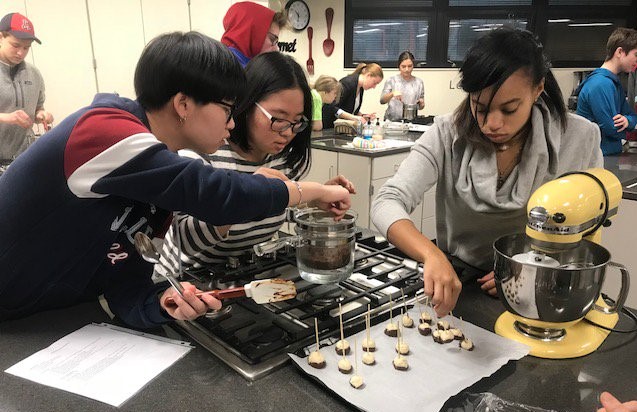
Gourmet
Gourmet
In this cooking class, students with or without experience explore the hows and whys of preparing delicious foods. Students work together in the culinary lab to plan, prepare, and serve food every day. Student input is an invaluable component of this course, and students propose recipes of their own to add to the curriculum. Course favorites include homemade pasta, brownie parfaits, steak tacos, dumplings, and pumpkin spice lattes. In addition, current food trends, cooking methods, and nutrition are discussed. This course fulfills the graduation requirement for fine and/or practical arts.
Learn more about Gourmet here: Link
-
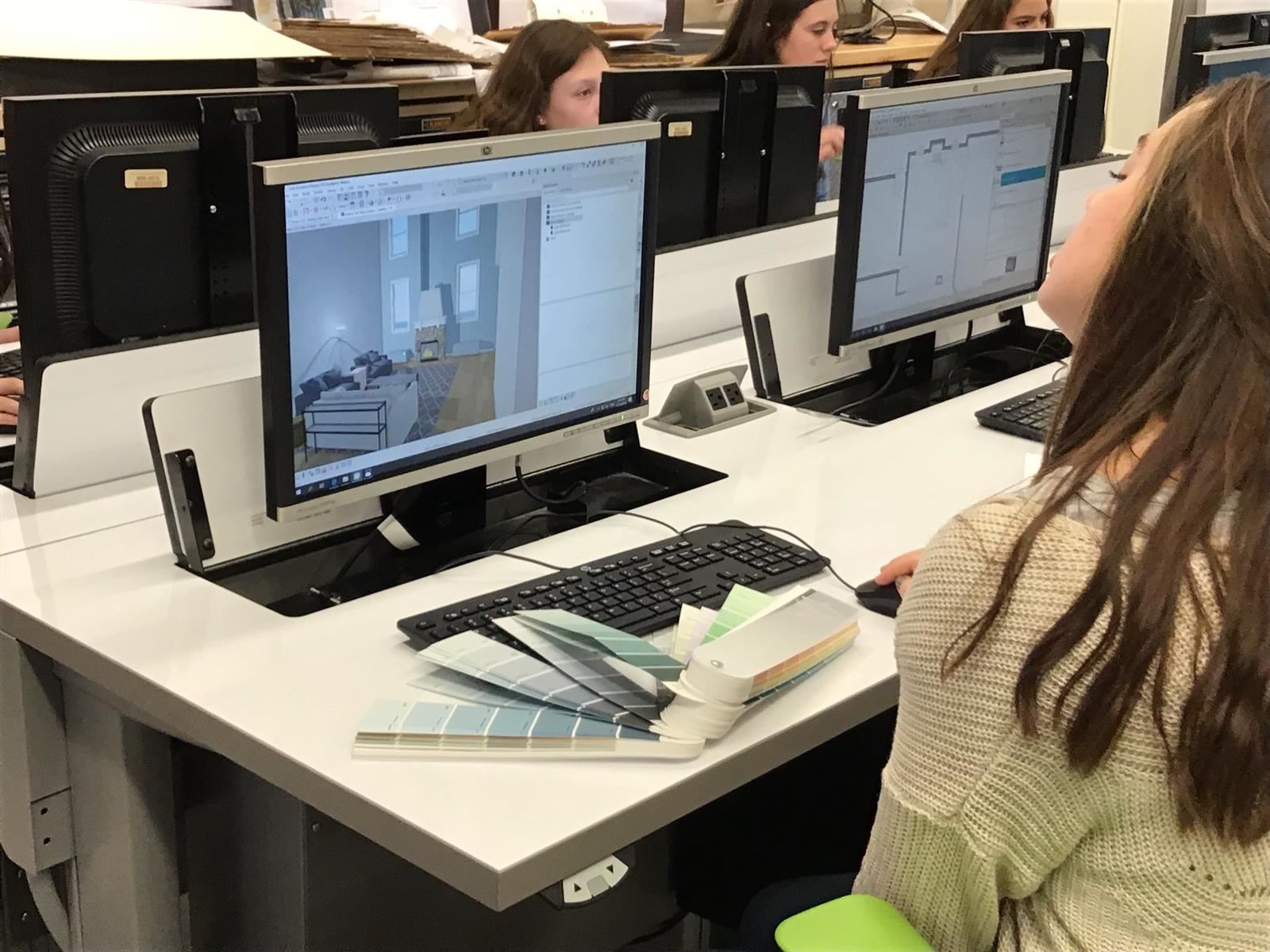
Interior Design
Interior Design
This project-based course introduces students to the field of interior design and the current 3D computer-aided design (CAD) software used by interior designers. Students are given design projects similar to those featured on HGTV. Units include room design (kitchens, great rooms and foyers), commercial and house redesign, and furniture and lighting design. Through class discussions, group work, hands-on experiences, guest presenters, and field trips to the Merchandise Mart, students gain an understanding of interior design concepts and encounter the challenges that interior designers face. Interior design is integrated with CAD software, design principles, construction, and presentation techniques. This course qualifies for dual college credit. This course fulfills the graduation requirement for fine and/or practical arts.
Learn more about this experience here: Link
-
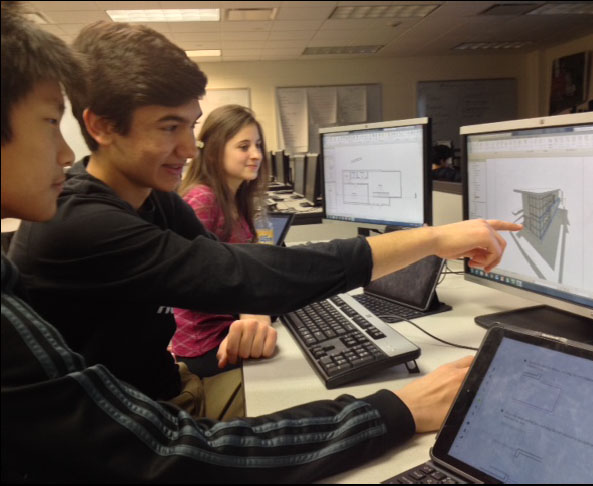
Introduction to Architecture
Introduction to Architecture
Design your own house plans like an architect! In a scaled down version of an architectural firm and studio, students will develop design skills as they imagine, discover and create 3D and 2D drawings and physical models. Students will also explore the latest industry software like Revit, Google Sketchup, Illustrator and AutoCAD to use as a tool to communicate their designs. Throughout the year, students will build their design portfolios with outside-the-box work and will eventually design their own energy efficient sustainable home. Other projects include design-thinking creative solutions for healthy environments, community gathering spaces, new experiences, and Chicago Architecture Foundation projects. This course qualifies for dual credit at Oakton College. This course fulfills the graduation requirement for fine and/or practical arts.
Link to learn more about this class here: Link
-
Introduction to Computer Coding and Design Technology
Introduction to Computer Coding and Design Technology
This exploratory hands-on course uses an integrated approach to computer coding, technology and design. As a freshmen computer coding opportunity, students code drones, raspberry pies and robotics to learn fundamental computer science concepts and languages such as python. In addition to coding, students will learn different design tools and techniques that use Laser Cutters, 3D Printers, and prototyping power tools. Students who earn qualifying grades may be eligible to receive college credit. This course fulfills the graduation requirement for fine and/or practical arts.
Link to learn more about this experience here: Link
-
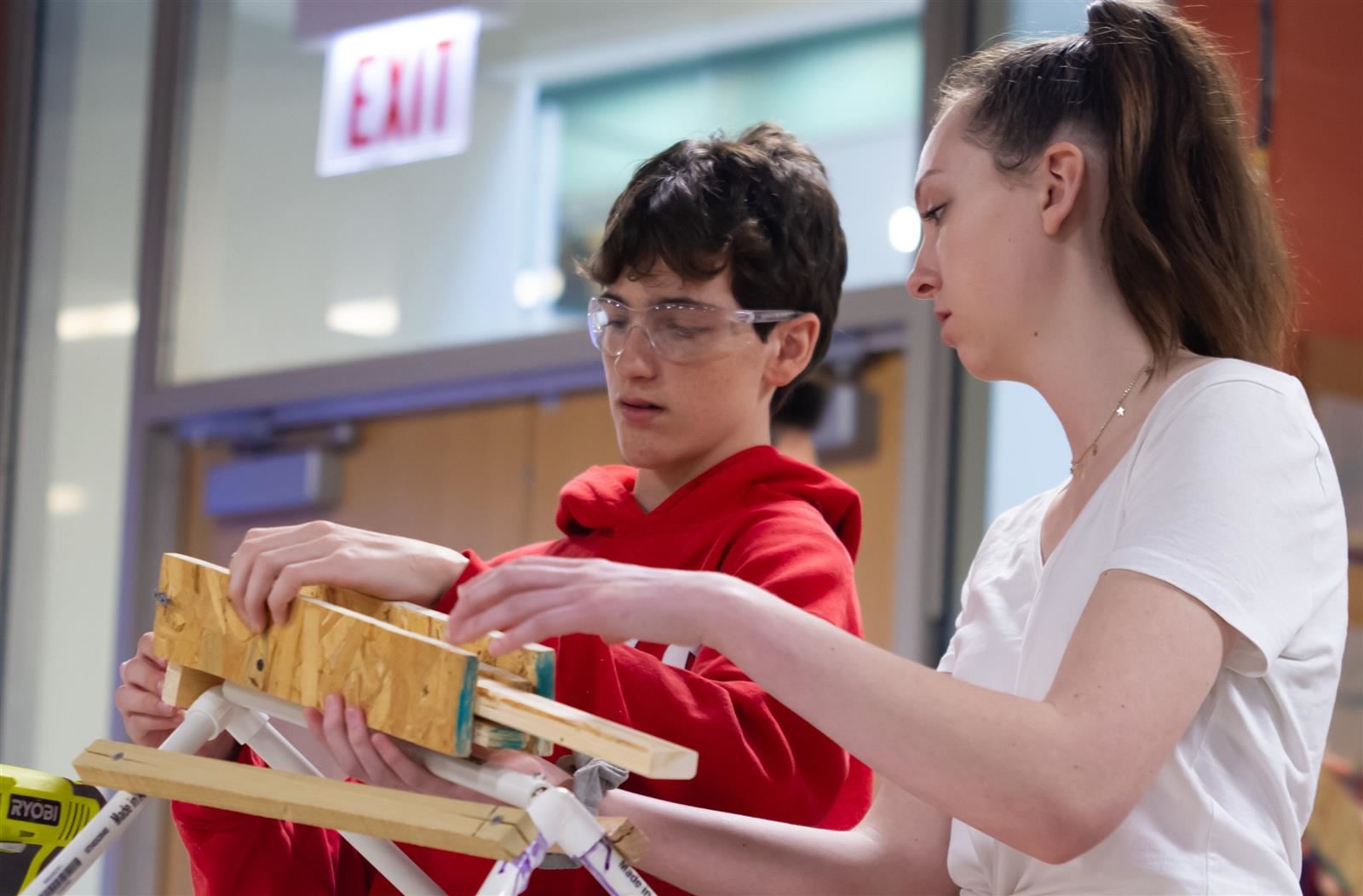
Introduction to Engineering Design
Introduction to Engineering Design
An engaging, fun, real-world hands-on studio, students from all backgrounds use a design-thinking approach to think, discover and design like an engineer. Together, we will dig deep into the engineering design process and be prompted with hands-on projects like designing a new toy or improving an existing product. The ability to problem-solve and think differently will be an asset for ANY future endeavor or study. Our approach will be to learn by doing and thinking through building and prototyping everything! Engineering CAD software, prototyping tools, laser cutters and 3D printers will be used to create real authentic engineered products. In addition to innovating products and projects with working parts, we will develop a mindset that enhances engineering through teamwork, creativity and communication. Students who earn qualifying grades may be eligible to receive engineering college credit. This course fulfills the graduation requirement for fine and/or practical arts.
Learn more about this experience here: Link
-
Introduction to Fashion Design
Introduction to Fashion Design
This hands-on lab course introduces students to the world of fashion. Through an integrated approach, the course combines machine work to construct clothing as well as personal and household items with the study of textiles, history, and trends in fashion. Students complete five projects throughout the course; the final project is the student’s choice. This course fulfills the graduation requirement for fine and/or practical arts.
Link to learn more about this experience here: Link
-
Makerspace: Industrial Design
New in 2023-2024
Makerspace: Industrial Design
In today's world, the ability to imagine something and make it rapidly is becoming a core skill set. This class will devote a semester to learn the fundamentals of industrial design through the use of design tools and digital fabrication processes. You will discover through hands-on project based learning how to go from sketch to product. Throughout the year, students will be engaged in a Makerspace using all types of high-tech technology and power tools. The second semester will focus on student choice research and design and development projects. This class will bring together diverse creative interests and backgrounds to learn how you can make anything through technology, research, and design. Students will maintain a portfolio that tracks their progress and will develop a final project presentation that will be shared with a professional panel. This course fulfills the graduation requirement for fine and/or practical arts.
Learn more about this experience here: Link
-
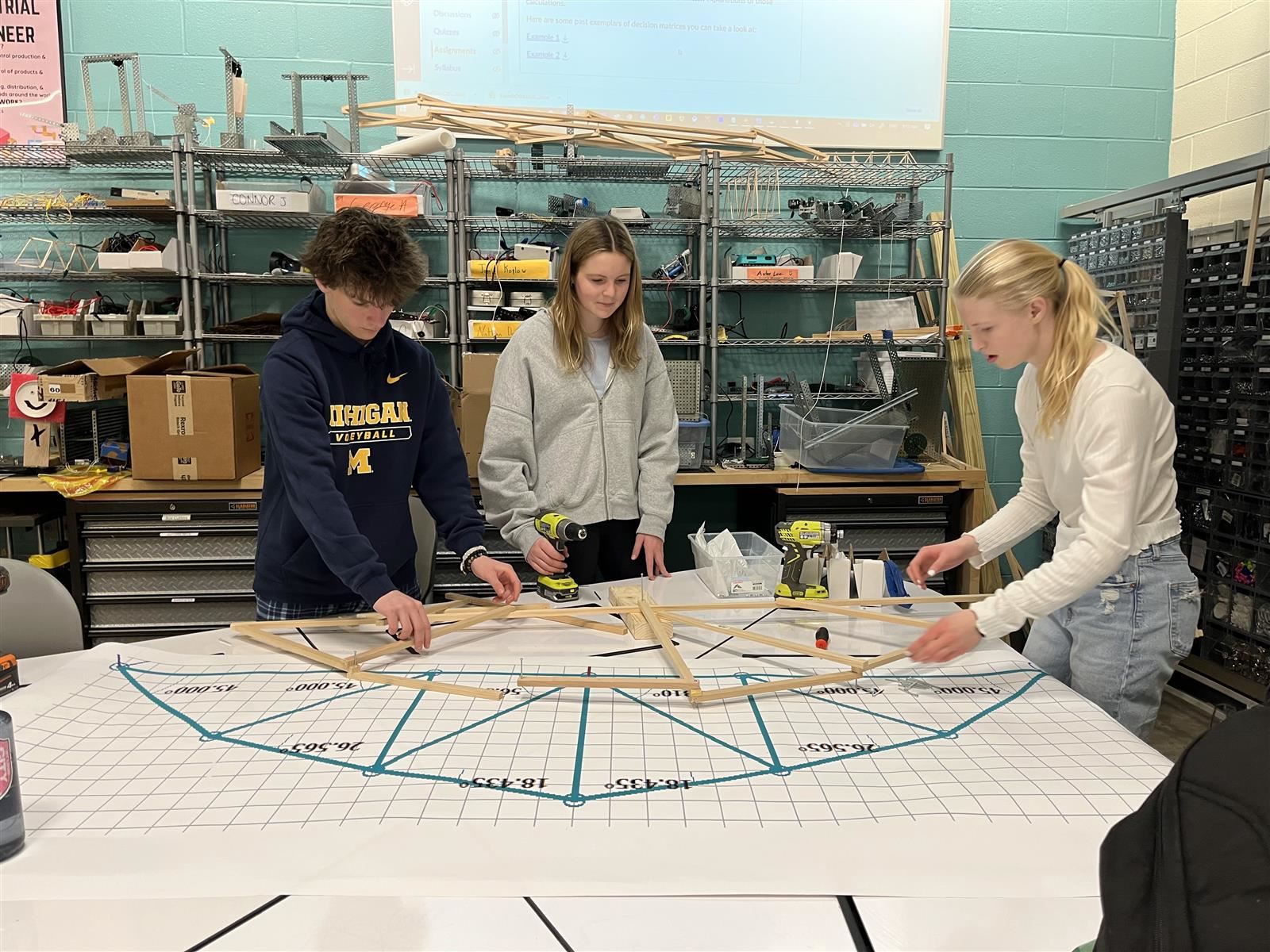
Principles of Engineering
Principles of Engineering
Through real-world problems that engage and challenge, students explore a broad range of engineering topics, including mechanisms, the strength of structures and materials, programming and automation. Students develop skills in problem-solving, research, and design while discovering strategies for the design process, collaboration, and presentation. This hands-on inclusive environment allows students to discover how “things” work and how to make “things,” in a variety of engineering fields. Themes and concepts expose students to what they will encounter in a postsecondary engineering course of study. The course gives students the opportunity to work on projects in a variety of engineering fields. Students who earn qualifying grades may be eligible to receive engineering college credit. This course fulfills the graduation requirement for fine and/or practical arts.
Learn more about the expereince here: Link
-
Principles of Fashion Design
Principles of Fashion Design
This semester fashion course builds on the skills and knowledge learned in Introduction to Fashion Design, focused on the elements of design. In this course, students will explore the influential factors in the fashion industry, such as environmental impacts, trends, cultures and ethics. Students will also gain practical experience in creating and presenting their work, using industry software and technology, and careers in the fashion world. This course fulfills the graduation requirement for fine and/ or practical arts.
-
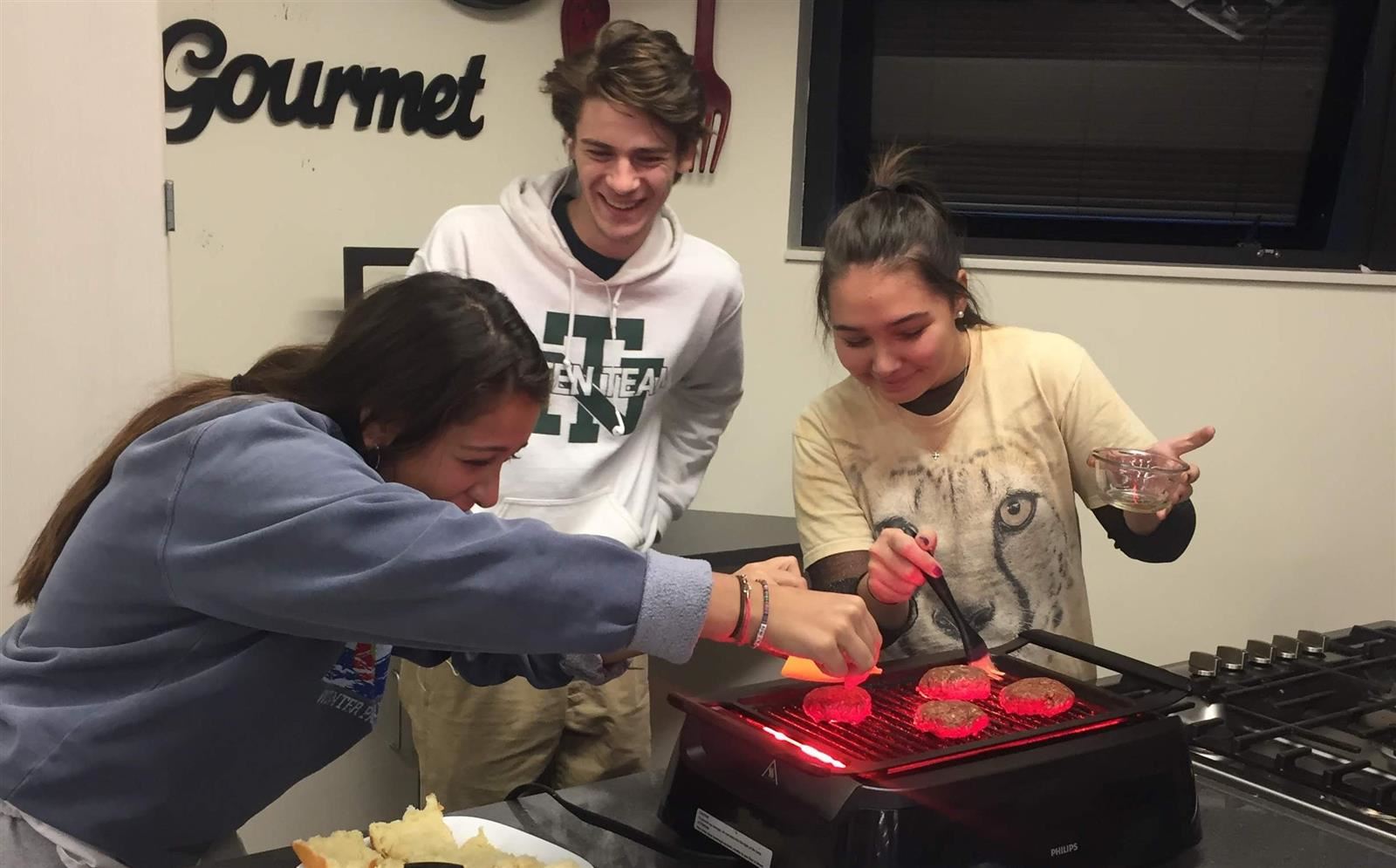
Real-World Cooking for Seniors
Real-World Cooking for Seniors
This course is designed to prepare seniors for living independently post-high school; whether it be in a college dorm or first apartment. The focus of this course is to prepare healthy, nutritious meals on a budget within a limited amount of time. Cooking labs will consist of preparing dishes in the microwave, grill, oven and stovetop. Students will prepare and eat a variety of meals or snacks almost every day of the week. Course favorites include: Breakfast sandwiches, Chocolate Mug Cakes, Barbecue Chicken Nachos, Grilled Shrimp Alfredo, Tacos and Sushi. This course fulfills the graduation requirement for fine and/ or practical arts.
Learn more about this expereince here: Link
-
Skilled Trades and Emerging Careers
Skilled Trades and Emerging Careers 1
Have you ever wondered how to build, create or repair something in your home yourself? Our lab environment is inclusive to all students, and we use a hands-on approach to discover how to create residential carpentry, wiring, plumbing, manufacturing, and green technology projects. We have a goal to expose students to the DIY and career aspect of the mentioned careers. Students will also have the potential to earn an industry certification prior to leaving high school. Open to all students, no experience required. This course qualifies for college dual credit in Residential Wiring. This course fulfills the graduation requirement for fine and/or practical arts.
Learn more about this experience here: Link
Skilled Trades and Emerging Careers 2
Skilled Trades and Emerging Careers 2 will be an opportunity for year two students to dive deeper into projects and become team leaders and project managers. Furthermore, students will be exposed to advanced techniques and the commercial side of carpentry, electrical wiring, manufacturing, printing and green technology. An emphasis will also be placed on emerging career opportunities and trends. This course fulfills the graduation requirement for fine and/or practical arts.
-

Urban Design and Civic Engagement
-
Urban Design and Civic Engagement
In this studio-based course, students will design future cities and land development plans. Discovery will be focused on the structure of urban planning and how policy, sustainability, economics, humanities, technology and social relationships come together in urban design. Together, we will also investigate, through hands-on projects, how existing cities, suburbs, and metropolitan areas have changed over time and ways communities are being revitalized or totally reimagined from the ground up in emerging parts of the country. Using understanding and synthesize, students will ideate and prototype new urban concepts, developments and/or planned communities. Designs will be communicated through CAD programs, design proposals and physical modeling and prototyping. This course fulfills the graduation requirement for fine and/or practical arts.
Link to learn more about this experience here: Link
-
-
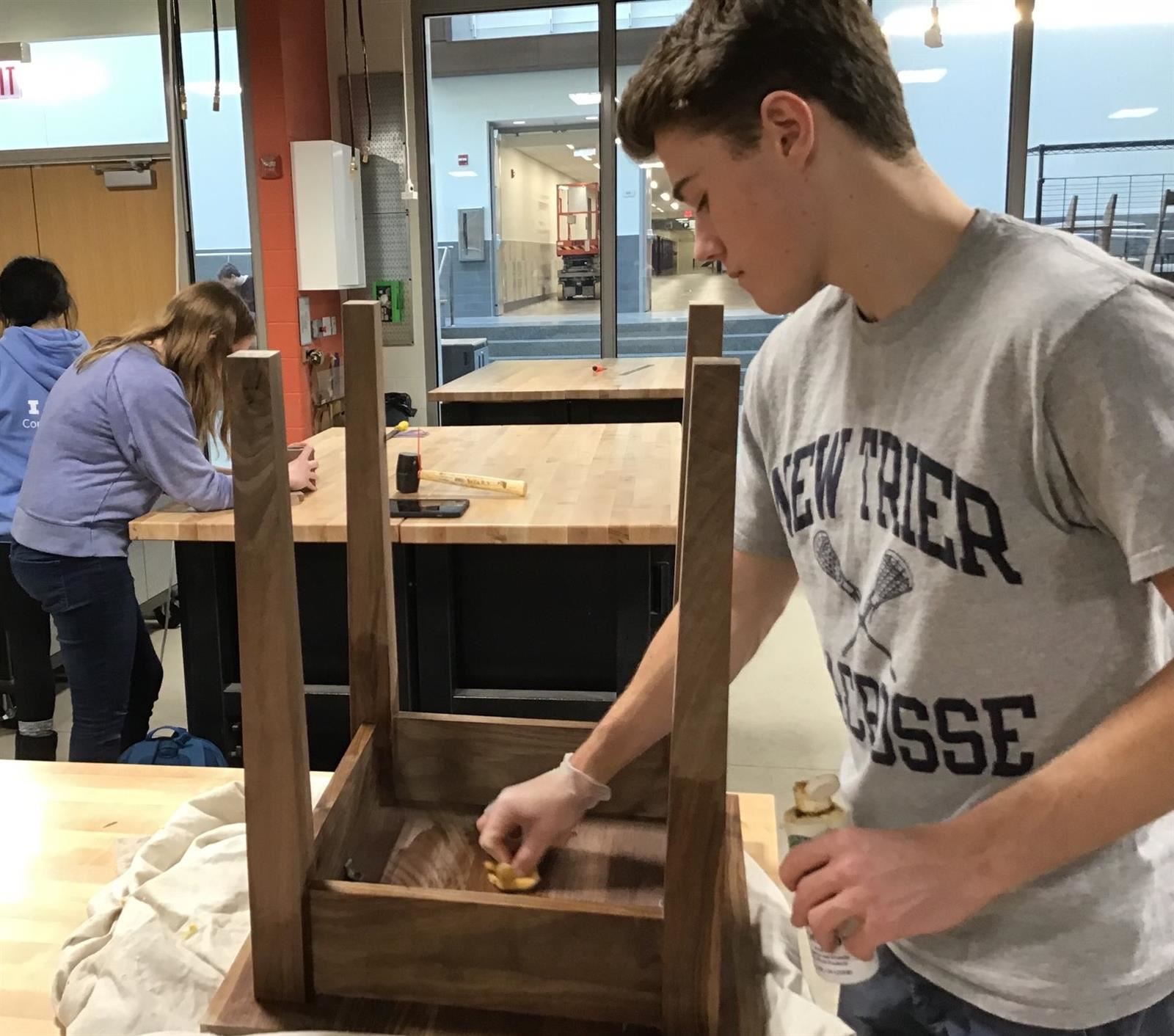
Woodworking Design Studio
Woodworking Design Studio
In this course, students learn how to design and construct projects made from wood and/or metal through hands-on experiences. Students develop skills in working with both materials, such as wood turning and welding, through the use of tools that enable them to design and build a wide variety of DIY projects ranging from candlesticks to decorative boxes to furniture. The skills acquired in this course can be applied to hobbies, home improvement projects, and careers in design, architecture, and engineering. This course fulfills the graduation requirement for fine and/or practical arts.
Learn more about this course here: Link
Applied Arts Contact Information
- 385 Winnetka Ave Winnetka, IL 60093
- Northfield
- Winnetka
| Showing results for "Professor named Smith at Elementary School" |
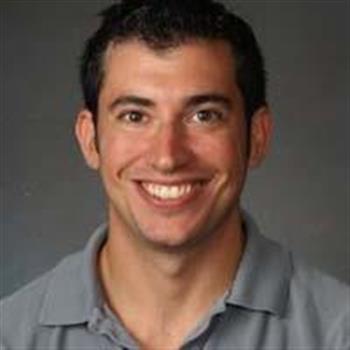
- Jason Boumstein

- Sabrina Lafevers
- Peggy Maisel



